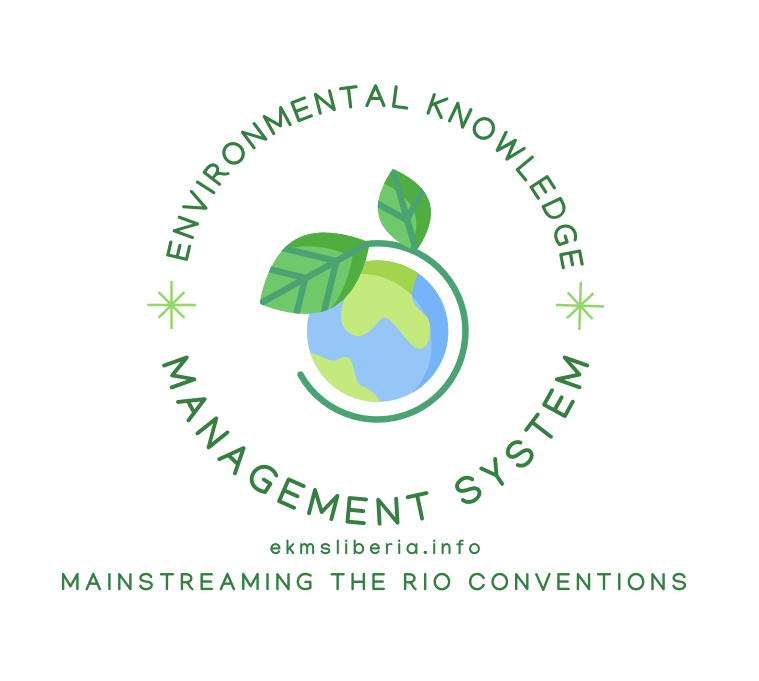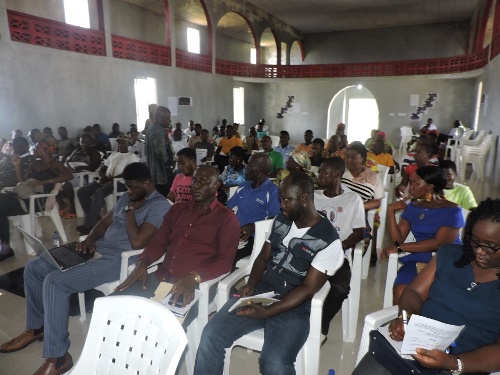Cross-section of Participants at the Stakeholder’s review for the 1,200mm pipeline water project from Mt. Coffee Dam to the White Plains Water Treatment Plant
As residents representing several affected towns registered ‘no objection’ to the project
Millennium Challenge Account (MCA) Liberia will today, November 1, 2019 break ground for the construction of a US$18 million raw water pipeline between Mount Coffee Hydro-power Plant and the White Plains Water Treatment Plant, following stakeholders’ review organized by authorities at the Environmental Protection Agency (EPA), an EPA release says.
MCA-Liberia is a Liberian-government agency created in 2015. It is responsible to implement a US$257 million grant provided by the American Government through the Millennium Challenge Corporation (MCC).
According to the release, residents representing several towns in the Harrisburg township ‘registered no objection’ to the construction of the 1200 millimeters (diameter) Raw Water Transmission Pipeline from Mount Coffee Hydro-power Plant to the White Plains Water Treatment Plant, during the stakeholders meeting.
Kawusu Toure, EPA assistant manager for environmental social impact assessment (ESIA), said the gathering, which brought together residents, representatives of line ministries and agencies, was intended to review an ESIA for the construction of the pipeline.
The ESIA, according to Mr. Toure, was prepared by Liberia Engineering and Geo-Tech Consultants (LEG Consultants), an independent environmental evaluator for DENYS NV, a foreign-based firm contracted to construct the pipeline.
Toure told the citizens and those who attended the interactive forum that the ESIA report was presented to the EPA in pursuit of an Environmental Permit for the construction of the pipeline.
In a Powerpoint presentation, Mr. Toure explained that section 20; subsection (2 and 3) of the Environment Protection and Management Law of Liberia, mandates the EPA to constitute an Environmental Impact Assessment Committee to review Environmental Impact Statements and Management Plans.
John Jallah, EPA manager for compliance and enforcement, said the EPA cannot issue Environmental Permit in the absence of an ESIA report.
He said the stakeholders’ engagement is intended to hear from residents of the affected communities, as well as resolve issues surrounding social impact relative to the project.
LEG Technical Director, Nelson S. Jallah, who provided the project overview, said that the U.S., acting through the MCC, entered the Millennium Challenge Compact with the Liberian government to facilitate poverty reduction through economic growth in the country.
Jallah said the project, which is part of the compact between the two countries, is intended to replace the 900 millimeters diameter raw water pipeline leading from the Mount Coffee Dam to White Plains with a 1,200mm diameter raw water transmission pipeline.
He said that the replacement of the 900 mm diameter raw water pipeline to a 1,200 mm diameter raw water transmission pipeline, will improve reliability and better quality of the water provided.
Paul Kennedy, MCA-Liberia director for Environmental and Social Performance, lauded the EPA for the dialogue; and said that the construction of Raw Water Transmission Pipeline from Mount Coffee Hydro-power Plant to the White Plains Water Treatment Plant is intended to pump safe drinking water to the 1.2 million people in Monrovia.
Kennedy said the construction of the pipeline is an environmental mitigation project following the rehabilitation of the hydro dam’s impact on the water source to Monrovia.
He said salt water was entering the water source to Monrovia, and therefore, the new pipeline would be constructed above 20 meters above sea level into the hydro dam to prevent the salt water from entering the water supply system.
Mr. Kennedy said that the project was not part of original projects earmarked under the grant, “but it came about due to the sea water intrusion in the system.”
“Portion of the US$257 million grant,” he said, was used for the rehabilitation of the dam, and the maintenance of roads across the country.
Though the project is small and would last for six months, DENYS NV’s Frederic Fouillot said it will provide jobs for 100 residents of Harrisburg Township.
He then assured the public that the 100 contractors would be selected from across every community in the township, and that some farmers and properties owners would also be compensated for damaged crops, and structures that would fall in the routes the pipeline has earmarked for the project.
An international environmental specialist, Britta Lammers, hired to oversee the compensation process, is currently working to ensure that every person affected by the project gets their “just compensation.”
Some residents, in separate remarks, lauded the EPA for the engagement, and promised to cooperate with the project management team.


